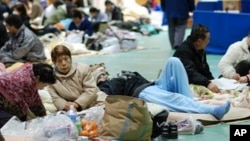The Tohoku region of Japan is grinding to a halt. It is the area hardest hit by last Friday's magnitude 9.0 earthquake, the devastating tsunami that tremor generated, which, in turn, crippled a nuclear power that is now spewing radiation.
With transportation routes destroyed or disrupted, the precious reserves of supplies that survived the natural disaster are quickly disappearing. Even when the roads are patched, truck drivers may be fearful of venturing too close to the crippled nuclear power plant.
I'm based this week in what is supposed to be a safe distance away from the leaking reactors and steaming fuel rods, but radiation levels in Fukushima prefecture's two biggest cities were significantly above normal on Wednesday.
I have been here since Saturday, the day after the quake. Each passing day there are fewer and fewer restaurants and stores open. Those that still have their doors open have fewer items for sale.
Some eateries offer specials - such as the fermented bean curd curry I had for lunch Tuesday or the Yen 1,500 "Disaster Sushi Set" that has been my dinner twice this week. I admit I've chased the fish with a few cups of yet abundant sake (traditional rice wine) after particularly stressful reporting days.
Some meals this week have been merely onigiri, rice rolled into a ball and wrapped in seaweed. A couple of those at midday, washed down with a typical Japanese "energy drink" (a dose of vitamins in a healthy liquid jolt of caffeine and nicotine), have sustained me until late in the evening.
Most hotels are not fully functioning - some might have electricity but, for example, no running water.
Here at the Route Inn, there is minor quake damage to the pavement. In the lobby is a certificate attesting to the building's high earthquake building standards.
The vending machines in the hotel and elsewhere in Koriyama will likely be totally bare by Friday. (And I'll be without my liquid energy boosts). We have not had any cleaning service for a couple of days. A skeleton staff remains. They spend much time answering phone calls and telling the walk-ins, including the newly homeless, evacuees and journalists, that there are no more rooms at the inn. In reality, the hotel seems practically empty. Every day, myself and another American reporter are asked when we intend to leave. They seem eager to shut down the place, but reluctant to kick us out.
Without a hotel we would be totally reliant on the kindness of strangers to take us in or we might have to seek refuge in already over-crowded refugee centers, which we have visited to interview the displaced.
With no gasoline available and after the mass exodus of evacuees from the 20-kilometer safety zone around the Fukushima-1 nuclear power plant, there are fewer vehicles on the roads each day. It is still possible to get a taxi. They are fueled by liquid propane gas and drivers assure us that reserves in the storage tanks, at least in Koriyama, remain adequate.
In Sendai, a three-hour drive to the north, vegetable prices have doubled after the tsunami destroyed a chunk of the Miyagi prefecture's capital. That said, there does not seem to be the pervasive price gouging one would expect after such a calamity.
Merchants may have traditionally ranked near the bottom of Japan's social hierarchy (below the samurai and farmers) but in most of the country trying to make a little extra money in times of adversity is just considered, well, unseemly and un-Japanese.
The traditional Japanese stoicism is on full display. There's a touch of bitterness in a few voices and some subtle signs of frustration but no show of open anger.
Everyone seems to take in stride the dwindling supplies of good and services. Maybe this part of Japan will soon see what followed in the dark days immediately after Japan's defeat in World War II: a thriving black market in scarce and rationed goods.
A few people are even willing to voice the darkest fear - what the scientists and government officials still contend is impossible: a meltdown at Fukushima-1 with one or more reactors going critical, spewing dangerous levels of radiation across Tohoku.
Sipping his sake and eating his "Disaster Sushi Set," a local construction planning company president reminds me and my colleague that modern Japanese descend from samurai warriors and kamikaze pilots who were willing, without complaint, to meet their fate. The bearded, smiling Takeshi Munakata says he believes in Japan and Japanese technology to pull the nation through the triple tragedy but if "I die, OK. No problem."
We sip our sake, preparing for the day ahead.
- VOA Correspondent Steve Herman covers Northeast Asia and is based in Seoul. He spent a total of 18 years in Japan.





